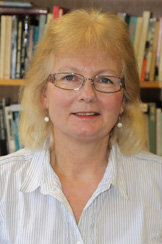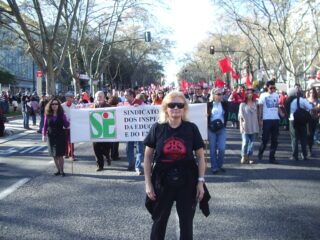- Entry type: Person
- Entry ID: AWE5001
Burgmann, Verity
(1952 – )
- Born 17 September 1952, Sydney, New South Wales, Australia
- Occupation Academic, Political activist, Political scientist
Summary
Professor Verity Burgmann is a leading Australian political scientist who has taught in Europe and Australia. She was the first female professor at Melbourne University’s School of Social and Political Sciences and has been active in the Women’s Caucus of the Australian Political Studies Association from its early days. She has a long history of radical political activism, including for Aboriginal land rights, the anti-Apartheid movement, female prisoners’ rights, the Public Education Group and environmental groups. Verity is currently Adjunct Professor of Political Science in the School of Social Sciences at Monash University, and Honorary Professorial Fellow in the eScholarship Research Centre at the University of Melbourne.
Read more about Verity Burgmann in our sister publication The Encyclopedia of Women and Leadership in Twentieth-Century Australia.
Details
Verity Burgmann was born in Sydney, Australia on 17 September 1952 to Lorna Constance (née Bradbury) (1915-2004) and Victor Dudley Burgmann (1916-1991), the youngest of four children after Jon (former civil engineer), Dr Beverley Firth (former public servant) and Dr Meredith Burgmann (former Labor MLC and President of the New South Wales Legislative Council). Lorna Burgmann named Verity after Verity Hewitt, well-known Canberra bookshop proprietor, with whose sister Mary Lorna had shared a flat while a student at Sydney University.
Fourth-generation graduates, Verity and her two sisters became the first three sisters in Australia to all achieve doctorates. The family’s strong intellectual and social service ethos shaped their lives. Verity’s paternal grandfather Dr Ernest Henry Burgmann was a politically progressive churchman who served as Bishop of Goulburn (1934-50) and Bishop of Canberra and Goulburn (1950-60). Her father Victor Burgmann worked in radar research during World War II then at the Commonwealth Scientific and Industrial Research Organisation (CSIRO), becoming CSIRO Chairman in 1977. Former NSW Labor politician, Verity Helen Firth, is her niece.
In 1975 Verity completed a Bachelor of Science (Economics) with First Class Honours at the London School of Economics (LSE) where she was awarded the Harold Laski Scholarship for best undergraduate essay and the Bassett Memorial Prize for topping her final year in the Department of Government. She returned to Australia in 1977 where she completed a PhD on Revolutionaries and Racists: Australian Socialism and the Problem of Racism at the Australian National University in 1981.
From mid 1975 until early 1977, Verity taught British Government at South London College and worked in the India Office Library as research assistant for an academic writing about communism in Kerala. Between 1978 and 1980 she tutored part-time in General Studies at the University of New South Wales and in Government at the University of Sydney, where she was impressed by political theorist Carole Pateman and concerned by her departure to the USA. After one year as full-time tutor in History at the University of New South Wales, she moved to Melbourne with her husband, where she worked as full-time tutor in Political Science (1981) and History (1982-83) at the University of Melbourne, then as Post-Doctoral Fellow at Deakin University (1984-86) and University of Melbourne (1986-87). From 1988, she lectured in the Political Science Department at the University of Melbourne, subsequently the School of Social and Political Sciences. In 2003, she became its first female professor. Verity remained an active member of the National Tertiary Education Union while working as an academic.
Briefly in the late 1980s, Verity was the sole female academic above tutor level in her department. Joined soon after by three new female lecturers, these young women academics discovered their male colleagues referred to them as ‘The Gang of Four’. Finding Australasian Political Studies Association (APSA) conferences similarly male-dominated, Verity became active in the Women’s Caucus of APSA, especially encouraged by, and collaborating with, Carol Johnson, Marian Sawer and Marian Simms. She became President of APSA 2002-03 following a year as its Vice-President. Verity was elected to the Academy of the Social Sciences in Australia (ASSA) in 1999 for her scholarship in labour history and politics, social movements and Australian studies. Within ASSA, she was especially inspired by the activism of Patricia Grimshaw and Jill Roe, who did much to confront ASSA’s patriarchalism.
As Deputy Dean of the Faculty of Arts between 2004 and 2007, she chaired more than fifty selection committees presiding over new academic appointments. However, following significant regime change in both the Faculty and the School of Social and Political Sciences, Verity felt beleaguered and bullied, and so decided to leave paid employment at the University of Melbourne in January 2013. From 1 April to 30 July 2013, Verity was Ludwig Hirschfeld Mack Visiting Professor of Australian Studies at the Institut für Englische Philologie at the Freie Universität Berlin. On her return from Berlin, she became an honorary Adjunct Professor of Political Science in the School of Social Sciences at Monash University, with the support of Monash Dean of Arts Rae Frances and Monash Politics Professor James Walter. Also in 2013, she was appointed an Honorary Professorial Fellow in the eScholarship Research Centre at the University of Melbourne, where she is Director of the Roger Coates Labour History Project and Reason in Revolt digital-scholarship platform (accessible at www.reasoninrevolt.net.au), an online resource of primary source documents of Australian political and cultural radicalism from the 1850s to the present day.
In addition to more than 70 refereed journal articles and book chapters, Verity is the author of Globalization and Labour in the Twenty-First Century (2012); Climate Politics and the Climate Movement in Australia, with Hans Baer (2012); Power, Profit and Protest (2003); Unions and the Environment (2002); Green Bans, Red Union, with Meredith Burgmann (1998); Revolutionary Industrial Unionism (1995); Power and Protest (1993); and ‘In Our Time’: Socialism and the Rise of Labour, 1885-1905 (1985). She is editor of Changing the Climate: Utopia, Dystopia and Catastrophe, with Andrew Milner and Simon Sellers (2011), and the four-volume A People’s History of Australia, with Jenny Lee (1988). Her work has been translated into Spanish, French, Japanese, Korean and Swedish. She regularly presents papers at conferences overseas and in Australia, including invited keynote and plenary addresses.
Verity has a long history of radical political activism, beginning in 1971 when a first-year student at the University of Sydney. She became involved in supporting Aboriginal land rights. She joined the anti-Apartheid movement, specifically the campaign that disrupted the tour of the racially selected Springboks Rugby Union team and forced cancellation of the impending South African cricket tour. While protesting at the Sydney Cricket Ground during the Springboks versus Wallabies match, she and her sister Meredith Burgmann were arrested for interrupting play. Verity succeeded in reaching the centre of the ground and kicked the ball out of the scrum. She received a $400 fine for ‘offensive behaviour’ while Meredith received a jail sentence that was suspended on appeal. Through this campaign, Verity met Gary Foley and became involved in support for Aboriginal land rights, especially the Tent Embassy established in January 1972. This political activism during the early 1970s brought her to the attention of the Australian Security and Intelligence Organisation (ASIO); she would later discover through accessing her ASIO file that not only ASIO but also MI6 in Britain kept her under surveillance.
MI6 became interested when she commenced a relationship during 1971 with Peter Hain, pioneer of the international sporting boycott of racially selected South African teams and leader of the UK Stop the Seventy Tour campaign. Verity discontinued her Arts degree at the University of Sydney and moved to London in July 1972 where she lived with Hain and his family, mixing with South African expatriate political activists, while commencing her politics degree at the LSE. Also in London, Verity joined the International Socialists, a Trotskyist-influenced organisation, which argued that the Soviet Union and similar Eastern Bloc countries were not socialist models but ‘state capitalist’ countries just as deplorable as capitalist ones, and emphasised militant rank-and-file working-class activism rather than reliance on reformist politicians and union officials.
Back in Sydney and Canberra from February 1977, Verity campaigned for female prisoners’ rights through Women Behind Bars, influenced by Virginia Bell and Julie McCrossin; marched in Sydney’s first Mardi Gras demonstration in 1978; and supported Indigenous rights campaigns. In Melbourne in the early to mid 1980s she was frenetically active in People for Nuclear Disarmament, even during the pregnancy and after the birth of her first child. A long-time critic of private school education including her own at Abbotsleigh, a private Anglican school for girls in Sydney, and experiencing the effects of underfunding of her sons’ local state high school, Verity became involved in the Public Education Group from the late 1990s onwards; she has frequently served as an office bearer in this organisation. Since early this century, she has joined in climate movement actions through participation in summits and demonstrations, and speaking often and writing much about ‘red-green’ issues, based on her scholarly work on the green bans movement and trade union environmental activism.
In 1977 Verity married the British-Australian cultural theorist and literary critic Andrew Milner whom she met at the LSE; they have three sons (David, James and Robert) and a grand-daughter Norah, named after the strong, female protagonist of Mary Grant Bruce’s Billabong books.
The revision of this entry in 2017 was sponsored by a generous donation from the later Dr Thelma Hunter.
Digital resources
Published resources
-
Resource Section
- Verity Burgmann, Harrison, Sharon M., 2014, http://www.womenaustralia.info/leaders/biogs/WLE0498b.htm
- Political Science, Grey, Madeline, 2014, http://www.womenaustralia.info/leaders/biogs/WLE0178b.htm
-
Resource
- Fellows List, Academy of the Social Sciences in Australia, 2017, http://www.assa.edu.au/fellows-list/
- Trove: Burgmann, Verity (19520917-), http://nla.gov.au/nla.party-502804
- Book
- Edited Book
-
Site Exhibition
- Women Who Caucus: Feminist Political Scientists, Australian Women's Archives Project, 2017, http://womenaustralia.info/exhib/caucus/
- The Encyclopedia of Women and Leadership in Twentieth-Century Australia, Smart, Judith and Swain, Shurlee (eds.), 2014, http://www.womenaustralia.info/leaders
Related entries
-
Related Women
-
Sister
-
Related Organisations
